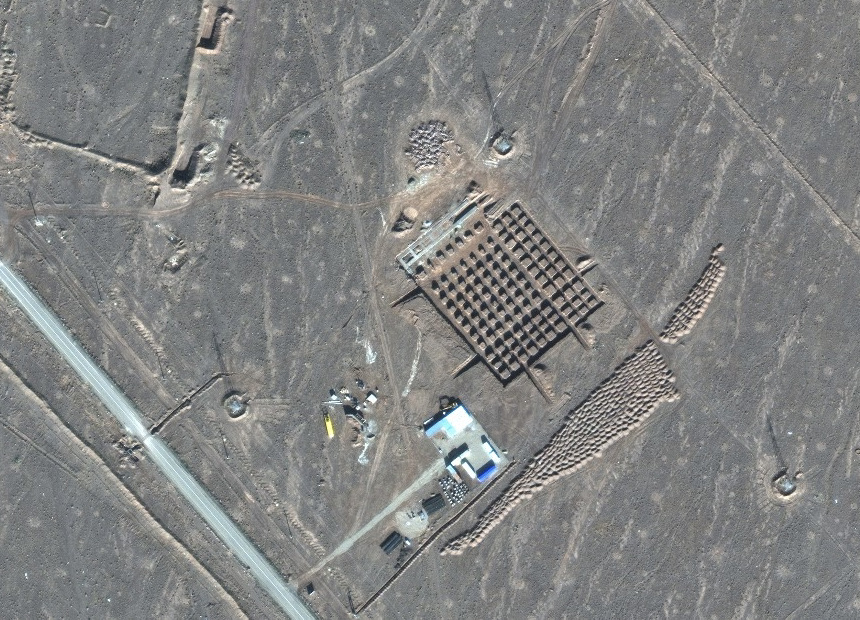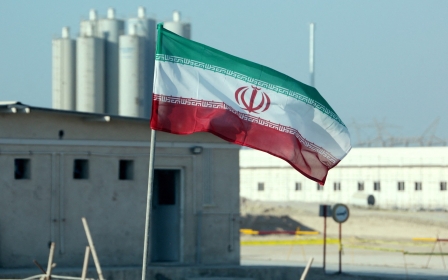Biden Middle East visit: Reviving the Iran nuclear deal alone won't stabilise region

As US President Joe Biden visits Israel and Saudi Arabia this week, it is clear that he has largely continued President Donald Trump’s policies in the Middle East, except his policy to return to the Iran nuclear deal.
“My administration will continue to increase diplomatic and economic pressure until Iran is ready to return to compliance with the 2015 nuclear deal, as I remain prepared to do,” Biden wrote in a Washington Post opinion piece, claiming that the Middle East was more "stable and secure" than when he took office.
In 2018, Trump withdrew the United States from the 2015 Iran nuclear deal, or the Joint Comprehensive Plan of Action (JCPOA) as it is formally known. After a year's delay, Iran began to end its compliance with the deal, reducing its transparency and moving step by step toward producing enough highly enriched uranium for a nuclear bomb.
This exacerbated tensions between Israel and Iran, resulting in cyber-attacks, security threats and shadow wars.
After Biden moved into the White House, Iran and the US began indirect negotiations on a return to "compliance for compliance". In March this year, it appeared that they had agreed to rejoin the nuclear deal, with two issues remaining unresolved: a commitment that the US would not again leave the nuclear deal; and that the US reverse Trump's placement of Iran's Revolutionary Guard Corps (IRGC) on the US list of foreign terrorist organisations (FTO).
On 26 June, after a three-month pause, the two countries held two days of indirect talks in Doha but apparently failed to achieve a breakthrough in their efforts to revive the 2015 deal. European Union envoy Enrique Mora characterised the discussions as “intense” and promised in a tweet to “keep working with even greater urgency to bring back on track a key deal for non-proliferation and regional stability".
Iran's nuclear negotiator, Ali Bagheri Kani, confirmed that the time and venue for a new round of talks to revive the deal were being finalised.
On 6 July, Qatar’s Minister of Foreign Affairs Sheikh Mohammed bin Abdulrahman Al Thani met with his Iranian counterpart, Hossein Amir-Abdollahian, in Tehran and reiterated that Qatar sought to support the parties of the talks on the revival of the nuclear accord to reach a fair agreement for all.
Breakthrough possible
While the Biden administration declined to delist the IRGC from the FTO, the most important issue remaining for Iran is that the Biden administration guarantees that the US would not withdraw from the JCPOA again. However Biden cannot limit the legal authority of the next president.
A breakthrough on the remaining issue is possible. The Biden administration and the other world powers could agree that, if the US withdraws again, Iran would have the right to leave the JCPOA.
The Biden administration and the other world powers could agree that, if the US withdraws again, Iran would have the right to leave the JCPOA
Further, if Iran remained committed to the Non-Proliferation Treaty (NPT) and the high-level transparency provided by the additional protocol to the NPT safeguards agreement, world powers would not refer Iran's action to the UN Security Council as a threat to international peace.
Without a deal, regional confrontations could follow from Syria to the Persian Gulf region, with implications for world energy markets. Even if the nuclear agreement was revived, however, there would be no guarantee of its sustainability unless complementary initiatives were taken to reduce regional tensions.
First, the process of improving Arab-Iranian relations must begin with a resumption of diplomatic communications between the two most powerful actors in the region: Iran and Saudi Arabia. Five rounds of talks have already taken place in Baghdad and there is reason to hope that the next round might result in some tangible improvements in their bilateral relations.
Dial down
The two countries need to dial down the confrontations between their forces and allies in Yemen, Syria, Iraq and Lebanon, which threaten to spread to the disruption of oil and gas transport out of the Persian Gulf.
The UN secretary-general could contribute by calling on the authority given him under Paragraph 8 of UN Resolution 598 to convene a meeting of the foreign ministers of the states around the Persian Gulf. This could help stabilise the status of the region as free of nuclear weapons and other weapons of mass destruction.
A second focus should be on reducing tensions between Iran and the United States. In addition to the revival of the JCPOA, there could be people-to-people exchanges and humanitarian measures such as prisoner exchanges. Regional issues have been the main source of animus between Washington and Tehran for the past 40 years, with the US Central Command (Centcom) butting heads with Iran's Quds Force.
Such hostility is not inevitable. Recall that the US victory in the 2001 war on terror in Afghanistan was greatly facilitated by the direct cooperation of Centcom and the Quds Force. Unfortunately, the Trump administration's decision to list the IRGC as a foreign terrorist organisation has made such cooperation impossible.
Third, the dangerous Israel-Iran shadow war must be dialled back. De-escalation of Israel's hostilities with Iran could play a direct role in reducing US hostilities with Iran.
Counterproductive
Last but not least, the Middle East will not achieve peace and stability without resolving the Palestinian crisis. Israel may be able to divert world and regional public opinion from Palestine to Iran, but that will not eliminate the urgency of a solution to the Palestinian crisis, the oldest and the mother of all other crises.
Biden is headed to Saudi Arabia to discuss broader security guarantees for Saudi Arabia and other US Arab allies in the region, including a collective air defence system.
The US blind alignment with Israel and Saudi Arabia to confront Iran is not a solution. Saudi Arabia's war in Yemen and export of jihadist fundamentalism are certainly partially at fault, as is Israel's occupation and colonisation of the West Bank.
The Trump administration tied the US-Arab-Israeli alliance to a “maximum pressure” policy. In return, Iran increased its leverage by expanding its nuclear programme and investing more in regional allies, which ultimately led to a 400 percent increase in the number of attacks on US troops in Iraq alone.
Such an US-Israeli-Gulf alliance is counterproductive since it could expand to an all-out war, trigger a nuclear arms race in the region, derail Saudi-Iran negotiations, and kill the opportunity for Iran and Arab states’ rapprochement around the Persian Gulf.
To achieve sustainable and global peace in the region, the US needs to become more of an honest broker in pushing for peace, stability and security, engage all the major regional stakeholders around the table, support ongoing diplomatic talks between Riyadh and Tehran and revive the JCPOA.
The views expressed in this article belong to the author and do not necessarily reflect the editorial policy of Middle East Eye.
Middle East Eye delivers independent and unrivalled coverage and analysis of the Middle East, North Africa and beyond. To learn more about republishing this content and the associated fees, please fill out this form. More about MEE can be found here.








